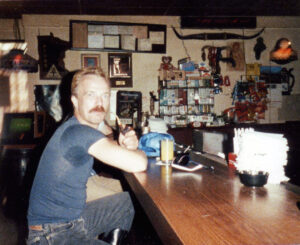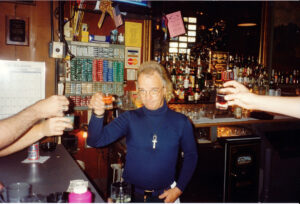Before ‘The Gayborhood’
6/5/2024
Bob Eikelberry at the Barn Door in 1981. Photo courtesy of Gary Moore
With another Pride month here, I have dug deep into the history books of the gay lore of Des Moines. In November of 2022, I wrote a column on the Blue Goose and the P&S Lounge, two gay bars with origins dating back to the late 1960s and early 1970s.
The P&S Lounge was located at 301 Second Ave. and owned by two lesbians, Peggy and Shirley. P&S eventually sold to Chuck Brooks (brother to Des Moines city councilman Archie Brooks) who went on to open many gay bars including the famous City Disco Park.
The Blue Goose was located at 206 Third St. and was owned by Marlys Watson and her husband, Marty.
The 1960s and 1970s was a wild time for “Gay Des Moines.” There were usually five or six gay bars in the heart of downtown around Court Avenue at any given time along with multiple dirty bookstores separating the store fronts.
The address of 1200 Grand Ave. was home to three different bars including the M-2 (owned by Tim Mumma and Steve Anderson), Stardust (Tim Mumma and Alan Hammond), and the more simplified name, 1200 Grand (Marlys Watson and Steve Anderson). A few were off the beaten path like the M-1, which was located up by the Bridgestone plant and conveniently located near Margo Frankel Woods, another historical cruising place in Des Moines where men would meet for casual sex encounters. I must also mention the two bars that win best name: The Corn Palace and the Mailbox. Yes, Des Moines was wild.
Many entrepreneurs were trying to tap into this built-in customer base back then, but Brooks and Watson were two of the most well-known in the community. When police would raid the gay bars and take people to the county jail, Watson would go the next morning and bail out her customers. When Chuck Brooks opened City Disco, it became THE dancefloor of the Midwest, much like the Garden would become decades later. This was also the first time straight folk found their way into the gay bar scene. According to some of the old Des Moines lore, Brooks, along with his Deejay Mike “Connie” Roper, brought disco music to this city. First, the gays were inviting their straight friends, and then the straights brought their other straight friends. Although we now live in a world where this is common practice, it wasn’t back then. In fact, the gay community was taken back by all the straight gawkers watching them dance. It ended up hurting the business, and the place eventually went up in flames by 1980. Literally.

Bob Eikelberry at the Blazing Saddle early 1990s. Photo courtesy of Blazing Saddle Archives
City Disco Park was not the only gay bar that had become a victim to a fire. The Country Cove, which was located where Pints is now on Court Avenue, went up in flames. This was another Chuck Brooks bar that was also Des Moines’ attempt in the all-male bar/bath house world. It didn’t last long. After the fire, Richard Upton opened the Barndoor in the same spot. The P&S Lounge was purchased by Chuck Brooks in the early 1970s and also went up in flames in 1975.
When all of this was going down, the city started to pay attention to the gay community, which had, up to this point, been mostly hiding in the shadows. Speculation was growing. Was this a form of gay bashing, or was there something going on between bar owners?
An article from January 1979 of the Des Moines Tribune had the headline “Are Gays Waging War in the Capital City?” It read: “A series of violent events directed at homosexuals and some gay taverns in Des Moines has law enforcement authorities here perplexed and worried. Indeed, the possibility that some sort of gay war is going on in the capital city has members of the gay community so concerned that they are reluctant to discuss the situation. Investigators have looked into the possibility of feuds between the straights and gays or a feud among homosexuals for control of gay bars in the city.”
The fires stopped in 1980. In 1987, Chuck Brooks opened his last tavern, Barbell Athletic Club (521 E. Sixth St.), and operated it until 1989. Then, Marlys Watson (along with Dixie Pinnegar) had her last hurrah with the D&M Pub, which eventually moved to 420 E. Locust until it closed in 1993. The old guard was all but gone.
Bob Eikelberry opened Blazing Saddle in 1983. A slew of others came through over the years including Ed Savage who ran Tacky’s, (309 13th St.), Carroll JR Jones, who ran Rendezvous (428 E. Locust), and Mitch Harris who ran Surprises (1367 21st St.). Let’s not forget all the folks who carried the torch for the Brass Garden (now the Garden), as well as all the establishments that lived at 508 Indianola Road (Club 508, Frathouse, Le Boi, etc.).
Today, we are down to only a few gay bars in Des Moines, all within a city block from each other: The Garden, Buddy’s and the Blazing Saddle. All are located in the East Village around East Fifth and Grand Avenue, which has been nicknamed “The Gayborhood.”
On June 13, The Varsity Cinema will be offering a one-night sneak of my upcoming OUTtv series, “The Last American Gay Bar,” at 7 p.m. A lot of this forgotten history and more will be covered as the first three episodes of the show are screened. ♦
Kristian Day is a filmmaker and writer based in Des Moines. He also hosts the syndicated Iowa Basement Tapes radio program on 98.9 FM KFMG. Instagram: @kristianday
Twitter: @kristianmday



















